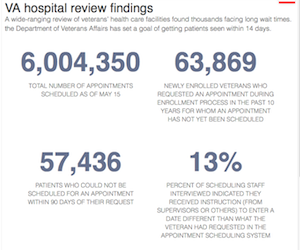WASHINGTON -- Staff members at dozens of Department of Veterans Affairs hospitals across the country have objected for years to falsified patient appointment schedules and other improper practices, only to be rebuffed, disciplined or even fired after speaking up.
The assertions were made in interviews with current and former staff members and internal documents.
The growing VA scandal over long patient wait times and fake scheduling books is emboldening hundreds of employees to go to federal watchdogs, unions, lawmakers and outside whistle-blower groups to report continuing problems, officials for those various groups said.
A half-dozen current and former staff members in Delaware, Pennsylvania and Alaska -- four doctors, a nurse and an office manager -- said that they faced retaliation for reporting systemic problems. Their accounts, some corroborated by internal documents, portray a culture of silence and intimidation within the department.
The federal Office of Special Counsel, which investigates whistle-blower complaints, is examining 37 claims of retaliation by VA employees in 19 states, and it recently persuaded the VA to drop the disciplining of three staff members who had spoken out.
Dr. Jacqueline Brecht, a former urologist at the Alaska VA Healthcare System in Anchorage, said in an interview that she had a heated argument with administrators at a staff meeting in 2008 when she objected to using phantom appointments to make wait times appear shorter, as they had instructed her to do.
She said that the practice amounted to medical fraud, and she complained about other patient care problems as well.
Days later, a top administrator went to Brecht's clinic, put her on administrative leave and had security officers walk her out of the building.
"It's scary to think that people can try to stand up and do the right thing, and this is the reaction," said Brecht, now in private practice in Massachusetts.
Her complaints were corroborated by other Alaska personnel and were the subject of an email that Brecht sent to a military doctor at the time.
Cynthia Joe, the chief of staff at the Alaska VA Healthcare System, said the facility had never used phantom scheduling and that no one had protested or faced disciplining after raising concerns.
In court filings detailing the VA response to other problems, Dr. Ram Chaturvedi, formerly with the Dallas VA Medical Center, said that he began complaining in 2008 about shoddy patient care, including negligence by nurses who had marked the wrong kidney while preparing a patient for a procedure. In another instance, Chaturvedi said, medical personnel had taken the wrong patient to an operating table.
A supervisor told Chaturvedi to "let some things slide" because of staffing problems, but he continued writing up complaints. Officials considered him disruptive and fired him in 2010.
At the VA Medical Center in Wilmington, Del., Michelle Washington, a psychologist treating soldiers with post-traumatic stress disorder, also found her worries unwelcome. She said in an interview that she faced retaliation when she testified in 2011 to a Senate committee about staffing shortages.
A week before her scheduled appearance, Washington said, she received an evaluation downgrading her performance at the hospital from "outstanding" to "unsatisfactory," citing management complaints she had never heard before. She was also stripped of some psychological treatment duties.
"I'm not sure how I went from outstanding to unsatisfactory in 30 days," Washington said. "The only intervening thing was my testimony."
Claims of retaliation by VA whistle-blowers are among the highest of any federal agency -- said Carolyn Lerner, who runs the Office of Special Counsel -- and have been documented by Congress going back at least two decades.
In 1992, a congressional report concluded that the VA discouraged employees from reporting problems by "harassing whistle-blowers or firing them." In 1999, a House subcommittee hearing on "Whistleblowing and Retaliation in the Department of Veterans Affairs" found little had changed.
One way the VA has silenced whistle-blowers, their lawyers maintain, is by threatening to hold them in violation of patient privacy laws if they discuss medical cases. That happened in a 2007 case in Chicago, where Dr. Anil Parikh was fired after reporting "systematic problems" that he said delayed patient care.
In terminating him, the VA alleged that he had violated confidentiality laws by reporting his concerns to the inspector general and to Barack Obama, at the time a senator from Illinois, and other government officials, court filings show. After four years, a grievance panel reinstated Parikh with back pay.
A Section on 06/16/2014

